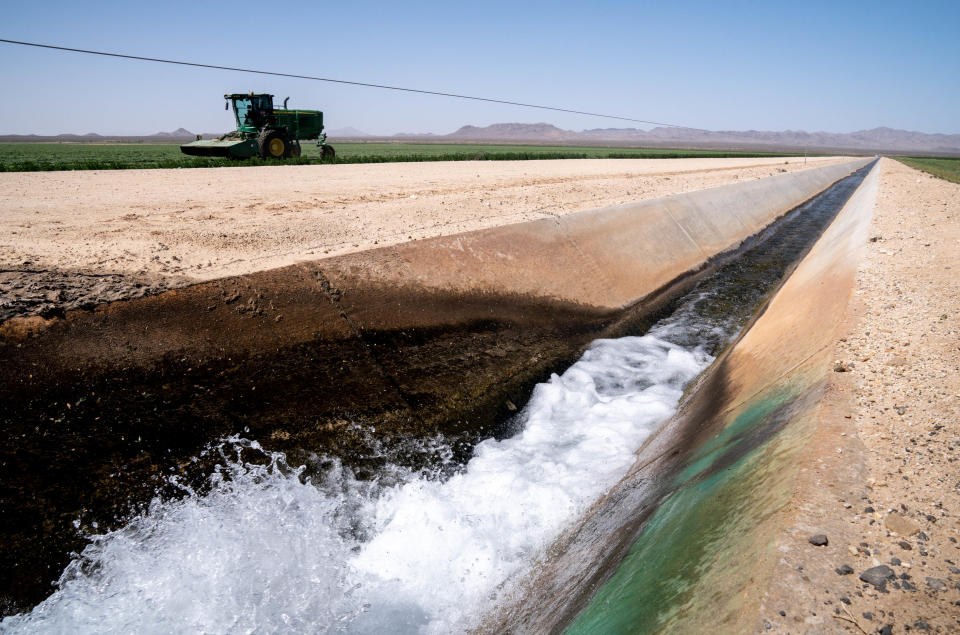The Saudis are enemy No. 1 in Arizona's water wars. That's dumb
Arizona has a problem.
We are an arid state with most of our population concentrated in what attorney Grady Gammage calls “oasis cities” — the two metropolises of Phoenix and Tucson.
Yet, Arizona is divided into 15 counties that send lawmakers to the state Legislature. Most of those counties are rural, and thus the less populated areas of the state enjoy outsized influence on state government.
In terms of water conservation, it means the metro areas, which understood long ago that we need to manage precious groundwater resources, have been willing to impose restrictions on their groundwater use.
Most of rural Arizona has not.
You need to understand that to understand why the Saudis have become public enemy number one in the water wars in Arizona.
Democrats have demonized Saudi alfalfa
Last year, Arizona elected a Democratic governor and attorney general who have put a harsh spotlight on Saudi alfalfa production in La Paz county, a farming region in west-central Arizona that borders California.
The Saudi alfalfa production near Vicksburg is not part of a groundwater management area, meaning there are virtually no rules for pumping groundwater.
The two Democrats have argued it is outrageous for a Saudi Arabia corporation to use Arizona’s precious water to grow alfalfa to feed the cows that produce the milk for The Kingdom.
One could forgive the Saudis a moment of amusement as Americans recoil at their foreign consumption of our U.S. natural resources, given that Americans have spent several generations with our snouts buried deep in the finite oil reserves of Saudi Arabia and the rest of the Middle East.
Democrats will say, well, those oil resources are plentiful. Oh yeah, it wasn’t the Republicans who popularized the expression “peak oil.”
But such is politics.
But the Saudis aren't a water outlier

Now Democrat Gov. Katie Hobbs and Attorney General Kris Mayes are determined to cut off Saudi alfalfa farmers from Arizona groundwater.
Fine.
But this is ultimately going to lead to larger questions about Arizona’s participation in the global economy, because there are a lot of business enterprises using Arizona’s precious water resources, including groundwater, to produce products for people living far beyond our state and national borders.
Given the scarcity of water in the desert Southwest, maybe it no longer makes sense to ship our water out of state in the form of alfalfa, lettuce, pecans, cotton, beef, milk, microchips ... you get the idea.
Yuma is the “‘Winter Salad Bowl’ capitol of the United States,” according to the 2018 state Department of Agriculture’s Guide to Arizona Agriculture. “It provides 90% of all leafy greens to the nation.”
Does that make sense when Arizona is in the middle of a megadrought? When climate change looms larger by the day?
It's tough to cut off Arizona from the world
Well, yes. Unless we want to live in quaint isolation from the rest of the world.
And maybe we do.
Perhaps Hobbs and Mayes would like to take their message to Mexico — which also struggles today with drought, climate change and managing its precious water resources — and tell it to stop growing produce with Mexican water to export to Arizona.
Because, as then-state Agriculture Department Director Mark Killian noted on Horizon in 2016, “Mexico ships into Arizona 5.4 billion pounds of fruits and vegetables.”
“The other day I went into Safeway to buy some fruits and vegetables and I noticed these beautiful gold peppers,” said Killian at the time. “And when I looked at the label, it said ‘Holland’ on it.”
For the last decade, many Arizona water leaders have called for a comprehensive reordering of groundwater regulation in Arizona. This newspaper has been on the forefront with its reporting and commentary.
Rural Arizona needs groundwater management
Hobbs and Mayes are right to focus on this issue.
They’re wrong, however, to single out the Saudis as the megavillain in this drama.
I won’t be the first to note that the Saudis, when it comes to our Arizona dilemma, are a drop in the bucket. This is an issue far broader and deeper than the alfalfa fields in La Paz.
Another view: The Saudis are draining Arizona? Not exactly
If the tables were reversed, and the Republicans were attacking the Saudi farmers, the Democrats would have played the race card faster than a royal flush.
They'd be screaming, “Xenophobia!”
More importantly, we’re demonizing Saudi farmers for doing something that is not at all remarkable in Arizona agriculture.
Nixing the Saudis won't solve this problem
Is this the beginning of demonizing all producers who turn Arizona water into global products?
Or are we finally going to get serious and expand groundwater management across the entire state?
That won’t be an easy task because the politics are thorny and the competing interests interminable.
It won’t be solved piecemeal, and it won’t be solved by turning our klieg lights on unsympathetic foreign actors.
This is ultimately about Arizona’s participation in the global economy.
Will we compete or will we retreat?
Phil Boas is an editorial columnist with The Arizona Republic. Email him at phil.boas@arizonarepublic.com.
This article originally appeared on Arizona Republic: Saudis have become Arizona's water enemy. They shouldn't be

